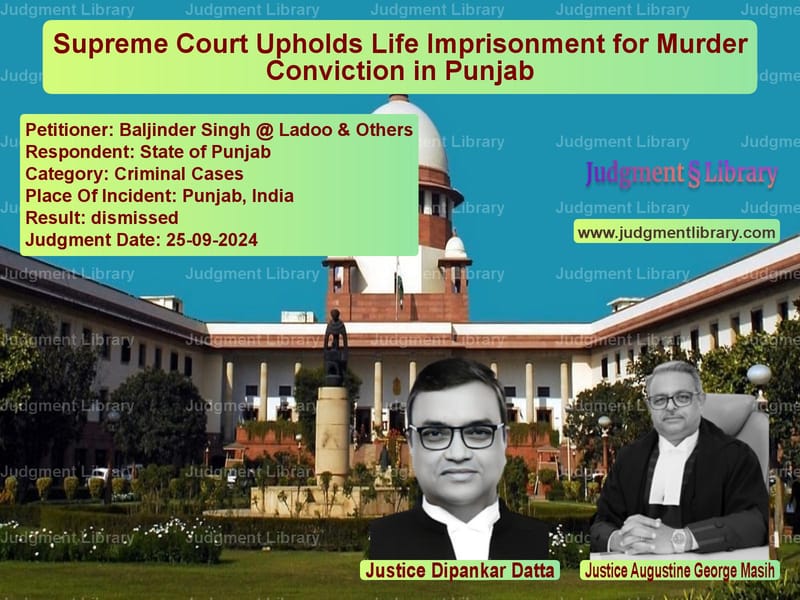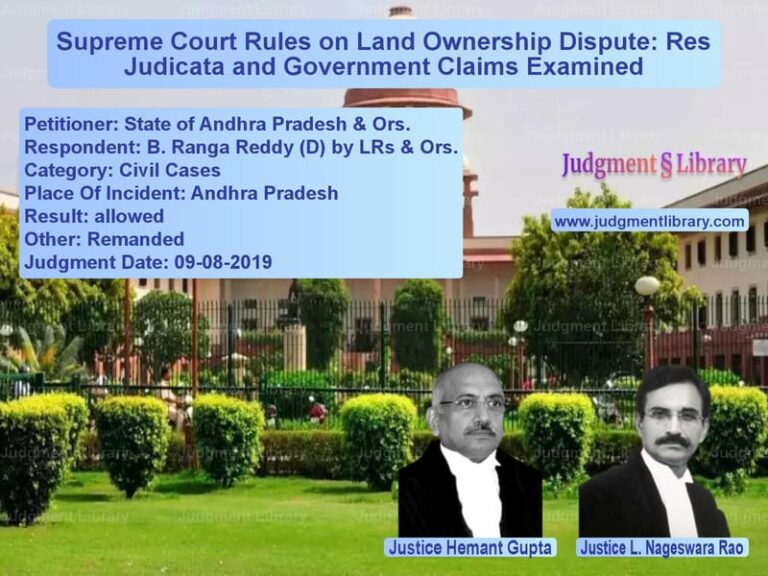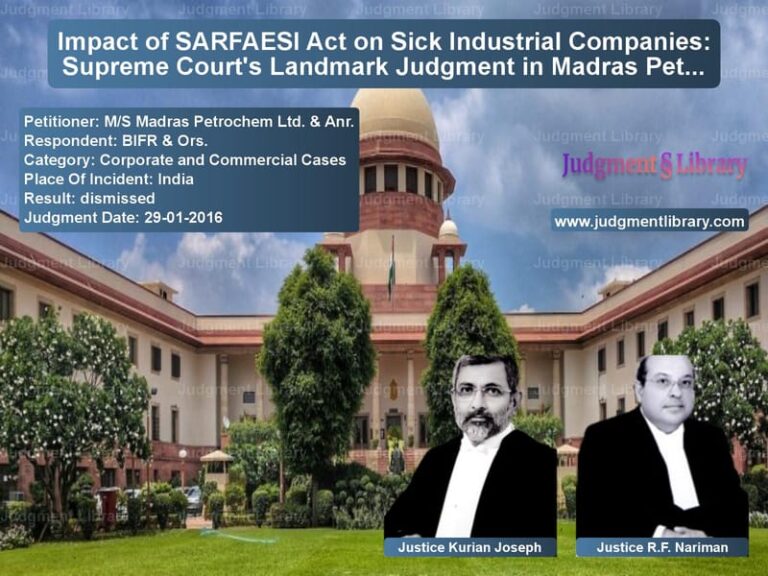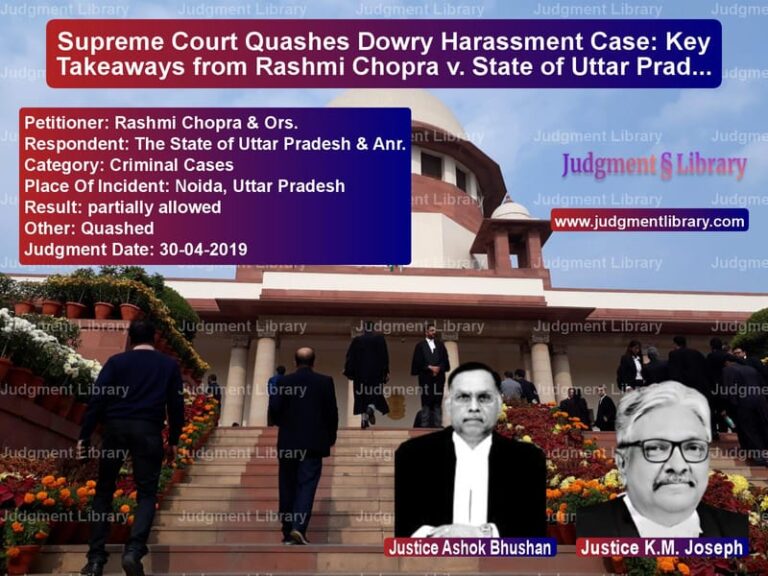Supreme Court Upholds Life Imprisonment for Murder Conviction in Uttar Pradesh
The case of Nitya Nand vs. State of Uttar Pradesh & Anr. centered around a brutal murder that took place in 1992 in Etah, Uttar Pradesh. The Supreme Court, in its judgment dated September 4, 2024, upheld the conviction and life sentence of the appellant, confirming the rulings of the trial court and the Allahabad High Court. The court found that the accused was an active participant in an unlawful assembly that committed the murder of the victim, Satya Narain, due to a long-standing property dispute.
This case highlights the principles of common object and vicarious liability under Section 149 of the Indian Penal Code (IPC), affirming that every member of an unlawful assembly can be held guilty for crimes committed in furtherance of their common objective.
Background of the Case
The case traces back to September 8, 1992, when Satya Narain was murdered near Ganga Ghat in Etah, Uttar Pradesh. The prosecution alleged that the murder was the result of a property dispute between Satya Narain and his elder brother, Shree Dev, whose four sons, including the appellant Nitya Nand, participated in the attack.
According to the First Information Report (FIR), the murder was witnessed by Satya Narain’s son, Sarwan Kumar, and other eyewitnesses. The assailants, armed with kanta (sharp-edged weapon), knives, and a country-made pistol, attacked Satya Narain while he was taking a bath in the river. The appellant, Nitya Nand, was accused of firing a shot in the air to deter rescuers while the other accused fatally assaulted the victim.
Legal Proceedings
Trial Court Conviction
- The Sessions Court convicted Shree Dev under Sections 147 and 302/149 IPC and sentenced him to life imprisonment.
- The appellant Nitya Nand and three others were convicted under Sections 148 and 302/149 IPC and sentenced to life imprisonment along with a fine.
Appeal in the Allahabad High Court
- In 2012, the Allahabad High Court upheld the trial court’s decision, affirming that the prosecution had proved its case beyond reasonable doubt.
- The court dismissed the appeal, emphasizing that the accused, including Nitya Nand, were part of an unlawful assembly that committed the murder.
Appeal Before the Supreme Court
The appellant approached the Supreme Court, challenging his conviction on the following grounds:
- There was no direct evidence of him causing injuries to the victim.
- The prosecution failed to recover the country-made pistol allegedly used to fire a warning shot.
- Crucial witnesses, including Laxmi Narain (brother of the deceased) and Kuldeep Kumar Tiwari (scribe of the FIR), were not examined.
- The conviction was based on suspicion rather than hard evidence.
Supreme Court’s Observations
The Supreme Court, comprising Justices Abhay S. Oka and Ujjal Bhuyan, reviewed the evidence and reaffirmed the lower courts’ findings.
1. Eyewitness Testimonies Were Consistent
- PW-1 (Sarwan Kumar) and PW-2 (Bhola Shankar) provided a detailed and consistent account of the incident.
- Both witnesses identified the appellant Nitya Nand as part of the group that attacked Satya Narain.
- The testimony was corroborated by medical evidence showing multiple ante-mortem injuries.
2. Role of the Appellant Under Section 149 IPC
- The appellant was convicted under Section 149 IPC, which states that every member of an unlawful assembly is liable for crimes committed in pursuit of the group’s common objective.
- The court cited Krishnappa vs. State of Karnataka (2012), emphasizing that an accused need not personally cause injuries to be held guilty under Section 149 IPC.
- The Supreme Court reaffirmed that mere presence and active participation in an unlawful assembly is sufficient for conviction.
3. Non-Recovery of Firearm Was Not Fatal to the Case
- Though the country-made pistol was not recovered, the court held that non-recovery of a weapon does not weaken a case when direct eyewitness testimony is reliable.
- The firing by the appellant was meant to prevent rescuers from intervening, further proving his role in facilitating the crime.
Final Judgment
The Supreme Court ruled:
- The conviction of Nitya Nand under Sections 148 and 302/149 IPC was justified.
- The appeal was dismissed, affirming the life sentence imposed by the trial court and upheld by the High Court.
- The ruling emphasized that courts must take a strict stance against mob violence and unlawful assemblies.
Implications of the Judgment
This ruling has significant legal implications:
- Clarification on Section 149 IPC: The judgment reaffirms that every member of an unlawful assembly is liable for crimes committed in furtherance of the common objective.
- Judicial Emphasis on Eyewitness Testimony: The court relied on credible eyewitness accounts, reinforcing their role in murder trials.
- Rejection of Technical Defenses: Non-recovery of weapons and failure to examine certain witnesses do not automatically weaken an otherwise strong prosecution case.
- Deterrence Against Unlawful Assemblies: The judgment serves as a warning against participating in mob violence, reaffirming the law’s commitment to justice.
By upholding the conviction of Nitya Nand, the Supreme Court has once again demonstrated its commitment to ensuring that criminals cannot evade justice by exploiting legal loopholes. The decision serves as a landmark ruling in reinforcing the principles of vicarious liability under Section 149 IPC and strengthening legal precedents in cases of unlawful assembly and murder.
Read also: https://judgmentlibrary.com/supreme-court-restores-charges-in-aiadmk-political-murder-case/
Petitioner Name: Nitya Nand.Respondent Name: State of Uttar Pradesh & Anr..Judgment By: Justice Abhay S. Oka, Justice Ujjal Bhuyan.Place Of Incident: Etah, Uttar Pradesh.Judgment Date: 04-09-2024.
Don’t miss out on the full details! Download the complete judgment in PDF format below and gain valuable insights instantly!
Download Judgment: nitya-nand-vs-state-of-uttar-prade-supreme-court-of-india-judgment-dated-04-09-2024.pdf
Directly Download Judgment: Directly download this Judgment
See all petitions in Murder Cases
See all petitions in Attempt to Murder Cases
See all petitions in Public Interest Litigation
See all petitions in Judgment by Abhay S. Oka
See all petitions in Judgment by Ujjal Bhuyan
See all petitions in dismissed
See all petitions in supreme court of India judgments September 2024
See all petitions in 2024 judgments
See all posts in Criminal Cases Category
See all allowed petitions in Criminal Cases Category
See all Dismissed petitions in Criminal Cases Category
See all partially allowed petitions in Criminal Cases Category







